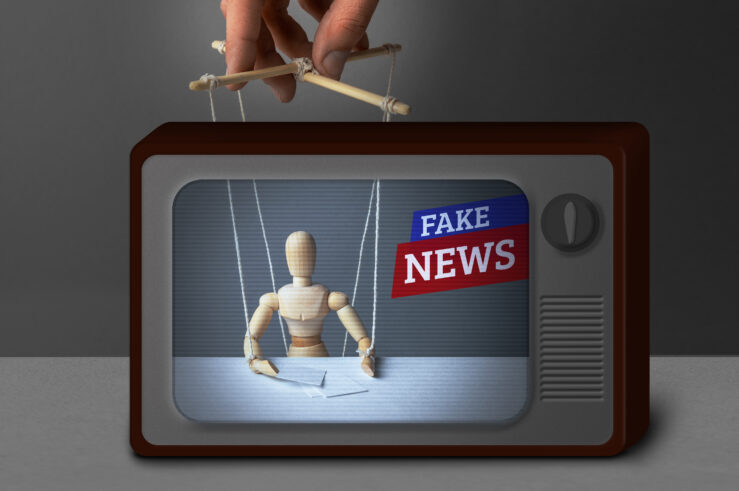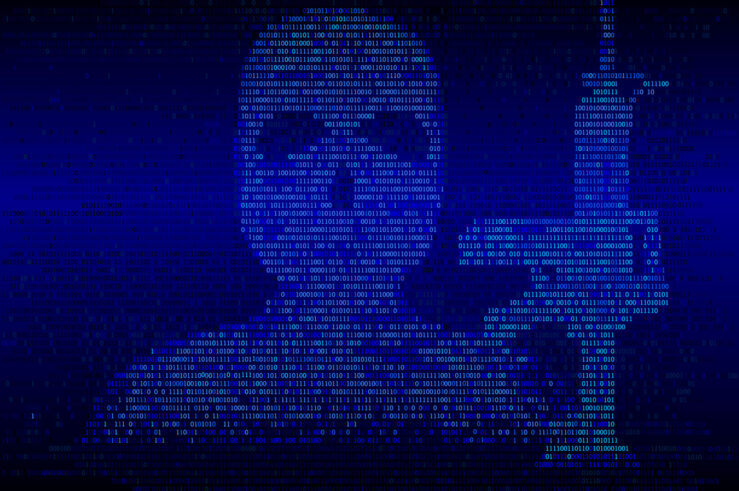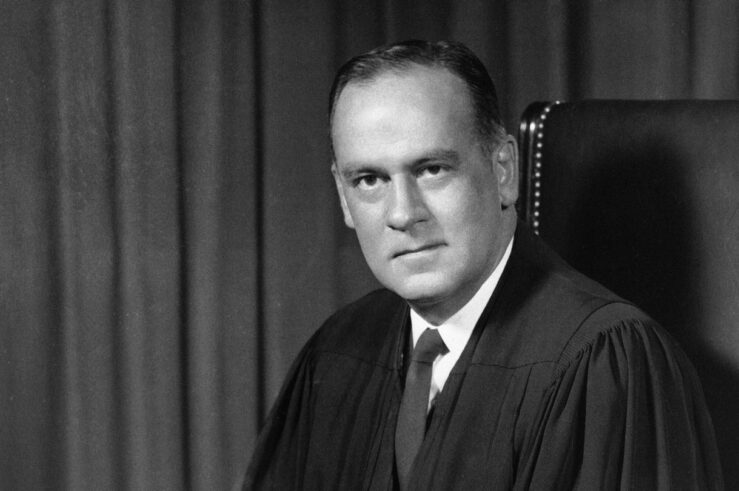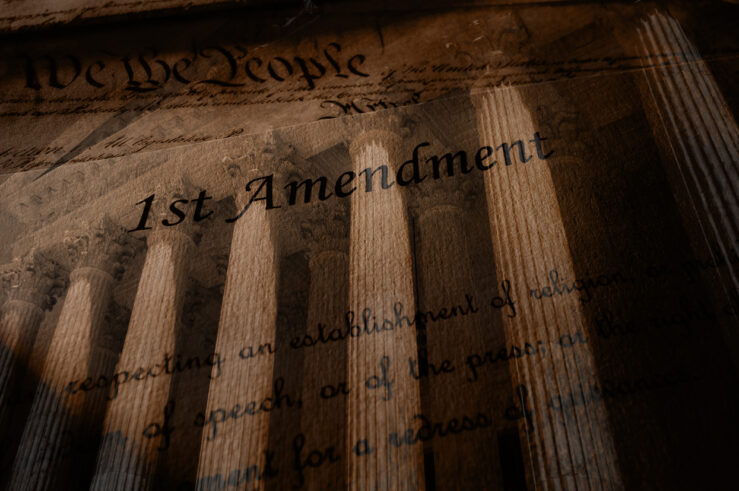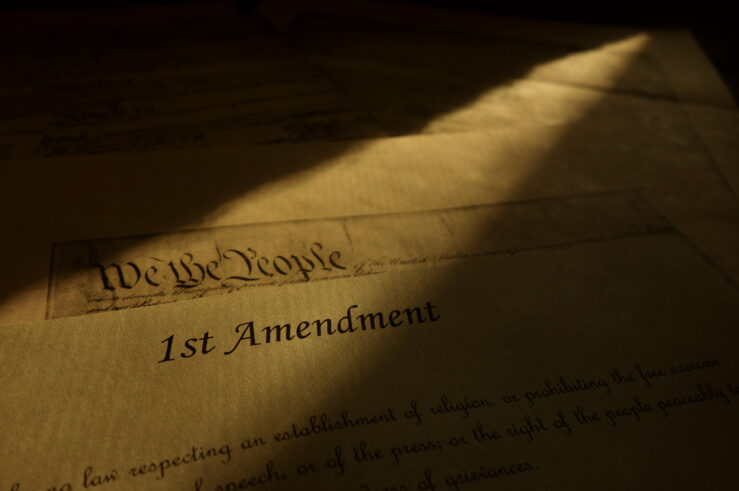Showing archive for: “First Amendment”
Twitter v. Taamneh: Intermediary Liability, The First Amendment, and Section 230
After the oral arguments in Twitter v. Taamneh, Geoffrey Manne, Kristian Stout, and I spilled a lot of ink thinking through the law & economics of intermediary liability and how to draw lines when it comes to social-media companies’ responsibility to prevent online harms stemming from illegal conduct on their platforms. With the Supreme Court’s recent decision in Twitter v. Taamneh, ... Twitter v. Taamneh: Intermediary Liability, The First Amendment, and Section 230
The Law & Economics of Children’s Online Safety: The First Amendment and Online Intermediary Liability
Legislation to secure children’s safety online is all the rage right now, not only on Capitol Hill, but in state legislatures across the country. One of the favored approaches is to impose on platforms a duty of care to protect teen users. For example, Sens. Richard Blumenthal (D-Conn.) and Marsha Blackburn (R-Tenn.) have reintroduced the Kid’s ... The Law & Economics of Children’s Online Safety: The First Amendment and Online Intermediary Liability
Twitter v. Taamneh and the Law & Economics of Intermediary Liability
The Senate Judiciary Committee’s Subcommittee on Privacy, Technology, and the Law will host a hearing this afternoon on Gonzalez v. Google, one of two terrorism-related cases currently before the U.S. Supreme Court that implicate Section 230 of the Communications Decency Act of 1996. We’ve written before about how the Court might and should rule in ... Twitter v. Taamneh and the Law & Economics of Intermediary Liability
How Will the Law Deal with AI Getting Facts Wrong?
It seems that large language models (LLMs) are all the rage right now, from Bing’s announcement that it plans to integrate the ChatGPT technology into its search engine to Google’s announcement of its own LLM called “Bard” to Meta’s recent introduction of its Large Language Model Meta AI, or “LLaMA.” Each of these LLMs use artificial intelligence ... How Will the Law Deal with AI Getting Facts Wrong?
Does the DOJ’s Approach in Gonzalez Point the Way Toward Section 230 Reform?
Later next month, the U.S. Supreme Court will hear oral arguments in Gonzalez v. Google LLC, a case that has drawn significant attention and many bad takes regarding how Section 230 of the Communications Decency Act should be interpreted. Enacted in the mid-1990s, when the Internet as we know it was still in its infancy, ... Does the DOJ’s Approach in Gonzalez Point the Way Toward Section 230 Reform?
The FTC Knows It When It Sees It
When Congress created the Federal Trade Commission (FTC) in 1914, it charged the agency with condemning “unfair methods of competition.” That’s not the language Congress used in writing America’s primary antitrust statute, the Sherman Act, which prohibits “monopoliz[ation]” and “restraint[s] of trade.” Ever since, the question has lingered whether the FTC has the authority to ... The FTC Knows It When It Sees It
NetChoice, Net Neutrality, and the Future of the First Amendment Online
In an expected decision (but with a somewhat unexpected coalition), the U.S. Supreme Court has moved 5 to 4 to vacate an order issued early last month by the 5th U.S. Circuit Court of Appeals, which stayed an earlier December 2021 order from the U.S. District Court for the Western District of Texas enjoining Texas’ ... NetChoice, Net Neutrality, and the Future of the First Amendment Online
The Market for Speech Governance: Free Speech Strikes Back?
The tentatively pending sale of Twitter to Elon Musk has been greeted with celebration by many on the right, along with lamentation by some on the left, regarding what it portends for the platform’s moderation policies. Musk, for his part, has announced that he believes Twitter should be a free-speech haven and that it needs ... The Market for Speech Governance: Free Speech Strikes Back?
Senate Bill Looks to Rebalance ‘Internet Freedom’ and Creators’ Rights
All too frequently, vocal advocates for “Internet Freedom” imagine it exists along just a single dimension: the extent to which it permits individuals and firms to interact in new and unusual ways. But that is not the sum of the Internet’s social value. The technologies that underlie our digital media remain a relatively new means ... Senate Bill Looks to Rebalance ‘Internet Freedom’ and Creators’ Rights
A Coasean Analysis of Offensive Speech
Words can wound. They can humiliate, anger, insult. University students—or, at least, a vociferous minority of them—are keen to prevent this injury by suppressing offensive speech. To ensure campuses are safe places, they militate for the cancellation of talks by speakers with opinions they find offensive, often successfully. And they campaign to get offensive professors ... A Coasean Analysis of Offensive Speech
How Changing Section 230 Could Disrupt Insurance Markets
In recent years, a diverse cross-section of advocates and politicians have leveled criticisms at Section 230 of the Communications Decency Act and its grant of legal immunity to interactive computer services. Proposed legislative changes to the law have been put forward by both Republicans and Democrats. It remains unclear whether Congress (or the courts) will ... How Changing Section 230 Could Disrupt Insurance Markets
An L&E Defense of the First Amendment’s Protection of Private Ordering
In his recent concurrence in Biden v. Knight, Justice Clarence Thomas sketched a roadmap for how to regulate social-media platforms. The animating factor for Thomas, much like for other conservatives, appears to be a sense that Big Tech has exhibited anti-conservative bias in its moderation decisions, most prominently by excluding former President Donald Trump from ... An L&E Defense of the First Amendment’s Protection of Private Ordering


